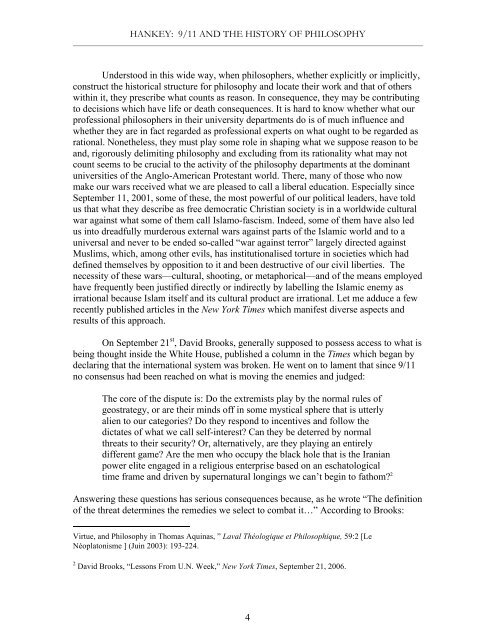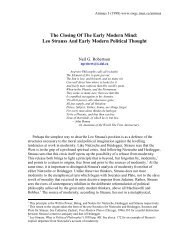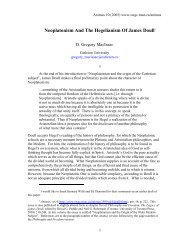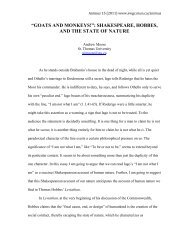Wayne Hankey, 9/11 and the History of Philosophy - Memorial ...
Wayne Hankey, 9/11 and the History of Philosophy - Memorial ...
Wayne Hankey, 9/11 and the History of Philosophy - Memorial ...
You also want an ePaper? Increase the reach of your titles
YUMPU automatically turns print PDFs into web optimized ePapers that Google loves.
HANKEY: 9/<strong>11</strong> AND THE HISTORY OF PHILOSOPHYUnderstood in this wide way, when philosophers, whe<strong>the</strong>r explicitly or implicitly,construct <strong>the</strong> historical structure for philosophy <strong>and</strong> locate <strong>the</strong>ir work <strong>and</strong> that <strong>of</strong> o<strong>the</strong>rswithin it, <strong>the</strong>y prescribe what counts as reason. In consequence, <strong>the</strong>y may be contributingto decisions which have life or death consequences. It is hard to know whe<strong>the</strong>r what ourpr<strong>of</strong>essional philosophers in <strong>the</strong>ir university departments do is <strong>of</strong> much influence <strong>and</strong>whe<strong>the</strong>r <strong>the</strong>y are in fact regarded as pr<strong>of</strong>essional experts on what ought to be regarded asrational. None<strong>the</strong>less, <strong>the</strong>y must play some role in shaping what we suppose reason to be<strong>and</strong>, rigorously delimiting philosophy <strong>and</strong> excluding from its rationality what may notcount seems to be crucial to <strong>the</strong> activity <strong>of</strong> <strong>the</strong> philosophy departments at <strong>the</strong> dominantuniversities <strong>of</strong> <strong>the</strong> Anglo-American Protestant world. There, many <strong>of</strong> those who nowmake our wars received what we are pleased to call a liberal education. Especially sinceSeptember <strong>11</strong>, 2001, some <strong>of</strong> <strong>the</strong>se, <strong>the</strong> most powerful <strong>of</strong> our political leaders, have toldus that what <strong>the</strong>y describe as free democratic Christian society is in a worldwide culturalwar against what some <strong>of</strong> <strong>the</strong>m call Islamo-fascism. Indeed, some <strong>of</strong> <strong>the</strong>m have also ledus into dreadfully murderous external wars against parts <strong>of</strong> <strong>the</strong> Islamic world <strong>and</strong> to auniversal <strong>and</strong> never to be ended so-called “war against terror” largely directed againstMuslims, which, among o<strong>the</strong>r evils, has institutionalised torture in societies which haddefined <strong>the</strong>mselves by opposition to it <strong>and</strong> been destructive <strong>of</strong> our civil liberties. Thenecessity <strong>of</strong> <strong>the</strong>se wars—cultural, shooting, or metaphorical—<strong>and</strong> <strong>of</strong> <strong>the</strong> means employedhave frequently been justified directly or indirectly by labelling <strong>the</strong> Islamic enemy asirrational because Islam itself <strong>and</strong> its cultural product are irrational. Let me adduce a fewrecently published articles in <strong>the</strong> New York Times which manifest diverse aspects <strong>and</strong>results <strong>of</strong> this approach.On September 21 st , David Brooks, generally supposed to possess access to what isbeing thought inside <strong>the</strong> White House, published a column in <strong>the</strong> Times which began bydeclaring that <strong>the</strong> international system was broken. He went on to lament that since 9/<strong>11</strong>no consensus had been reached on what is moving <strong>the</strong> enemies <strong>and</strong> judged:The core <strong>of</strong> <strong>the</strong> dispute is: Do <strong>the</strong> extremists play by <strong>the</strong> normal rules <strong>of</strong>geostrategy, or are <strong>the</strong>ir minds <strong>of</strong>f in some mystical sphere that is utterlyalien to our categories? Do <strong>the</strong>y respond to incentives <strong>and</strong> follow <strong>the</strong>dictates <strong>of</strong> what we call self-interest? Can <strong>the</strong>y be deterred by normalthreats to <strong>the</strong>ir security? Or, alternatively, are <strong>the</strong>y playing an entirelydifferent game? Are <strong>the</strong> men who occupy <strong>the</strong> black hole that is <strong>the</strong> Iranianpower elite engaged in a religious enterprise based on an eschatologicaltime frame <strong>and</strong> driven by supernatural longings we can’t begin to fathom? 2Answering <strong>the</strong>se questions has serious consequences because, as he wrote “The definition<strong>of</strong> <strong>the</strong> threat determines <strong>the</strong> remedies we select to combat it…” According to Brooks:Virtue, <strong>and</strong> <strong>Philosophy</strong> in Thomas Aquinas, ” Laval Théologique et Philosophique, 59:2 [LeNéoplatonisme ] (Juin 2003): 193-224.2 David Brooks, “Lessons From U.N. Week,” New York Times, September 21, 2006.4
















